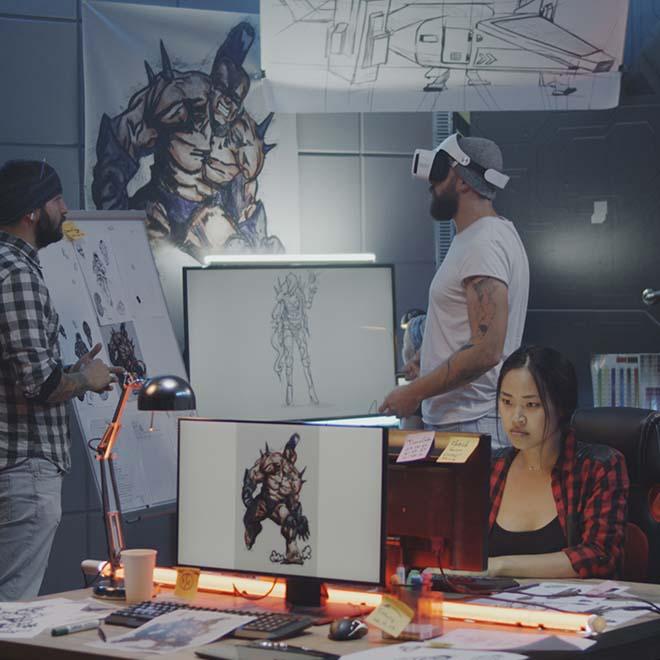Take IGMD-110 or IGMD-125
Summer term A begins. Apply by April 23.
Summer term B begins. Apply by June 18.
Fall Term A begins. Apply by Aug. 13.
Immerse Yourself in Interactive Game Design
As the gaming industry continues to grow, so does the demand for qualified game designers. The online Bachelor of Science in Interactive Game Design is a cutting-edge program designed for those who want to shape the future of the gaming industry. This comprehensive degree offers a unique combination of art, design, technology, and business knowledge tailored to the modern game designer. Many of the courses in this online game design degree program cover Rapid Prototyping design techniques, systemic architecture considerations, character development, and how narrative arcs drive gameplay through different levels. Graduates of the BS in Interactive Game Design program will be prepared for exciting careers in game art, systems design, and gameplay programming.
Finish your program faster with credit for prior learning and experience.
Differentiate your degree and get your resume noticed with an added certificate. Speak with your advisor for information.
Build Your Career Future
Game design is a fast-changing field, with new technologies and best practices constantly emerging. It’s essential that your degree helps you build a foundational skill set that can help you adapt and grow. This innovative game design program will help you craft detailed, immersive player experiences and carve your niche in the gaming industry.
Program Curriculum
Learn more about Champlain's 100% online Interactive Game Design degree, designed for your schedule.
Game Design Core (33 credits)
Game Development Requirements (9 credits)
Additional Requirements (12 credits)
Technical Electives (9 credits)
General Education Courses (42 credits)
General Electives (15 credits)
In this course, students will study key concepts such as player engagement, narrative development, and systems design and learn how to apply the principles of game design to narrative content in the development of engaging game experiences. By the end of this course, students should be able to demonstrate these design principles, showcasing their creativity, problem-solving skills, and the ability to adapt to evolving industry standards.
Building computer game levels, objects, and even characters requires numerous tools and techniques for systems design. In this course, students will gain hands-on experience with content creation and manipulation software for 3D modeling, level creation, and asset management. Students will iteratively refine and improve game designs. By the end of the course, students should be able to apply interactive design principles to combine digital assets for presentation in their portfolio.
In this course, students will practice rapid prototyping to generate diverse game treatments and genres based on the narratives they create. Students will practice ideation and iteration based on small-group feedback. As a result of this process, students will produce computer game functional parameters. By the end of the course, students will have authored game design documentation.
Prerequisites
In this class, students will make use of 3D modeling and design software to create objects for static illustration or motion by computer animators. Students will design, create, and manipulate objects in 3D, practicing texturing, lighting, and rendering techniques. By the end of the course, students will have gained experience creating the basic components of 3D models for a specific audience, taking into account culture, diversity and inclusion.
In this course, students will explore the world of interactive storytelling using a game design integrated development environment (IDE). Through hands-on projects, students will gain experience with techniques of implementing narrative elements into games. Students will learn how to engage players, create branching narratives, and design characters. Students will develop fundamental programming logic skills and by the end of this course, students will have created a game demo.
Prerequisites
Take IGMD-125
Computer game level design involves the creation of terrain and geography into game environment maps. In this course, students will learn how to integrate computer game narratives into virtual environments best fitting the storyline. Students will work through the level prototyping process, build level maps to place obstacles, integrate puzzles, and narratively support game missions. By the end of this course, students will have manipulated 3D level design editors to construct, texture, and illuminate game levels.
Prerequisites
Take GMDV-110 IGMD-225 and SCIE-230
Systems design involves building the elements in a game that the player does not control. In this course, students will learn the skills and techniques to implement environmental systems for gameplay, ensuring a smooth and consistent player experience. Students will focus on game functionality, mechanics, and player experience in single systems development. By the end of this course, students will have experience applying systemic thinking to a variety of object behavior and leveling scenarios using rapid prototyping techniques.
Prerequisites
Take IGMD-310
Designing functional multi-level environments is an important part of developing engaging computer games. In this course, students will use level editing software to create multiple levels that support game narratives. These levels will include puzzles and solvable challenges that advance the player through the game. This course addresses the aesthetic elements of level design including storytelling, set dressing, lighting, and mood. By the end of this course, students will have developed a multi-level game framework with narrative-supporting puzzles and environment design suitable for their portfolio.
Prerequisites
Take IGMD-310
Systems design includes construction of gameplay systems, progression systems, and systems such as camera controls and replays. In this course, students will build on what they learned in IGDM 325 - Systems Design and expand their work on single systems to multiple interlocking systems. By the end of this course, students will have developed a variety of systems such as level systems, talent trees, and combat systems suitable for their portfolio.
Prerequisites
Take IGMD-325
In this course, students will enhance their portfolio when they work individually to develop game narratives and storyboarded computer game quick pitches. Additionally, students will work in small groups to practice remote collaboration skills using standard industry tools. By the end of this course, students will be able to create a game design roadmap that specifies milestones for production tracking and completion according to an established timeline suitable for their portfolio.
Prerequisites
Take IGMD-410 IGMD-425 MGMT-260
The final experience in the Game Development program is to assemble a functional desktop or mobile mini game. In this course, students refine and assemble components of code and frameworks developed in the previous program courses. Students will also make use of provided audio, graphic, and animated assets for greater multimedia appeal and polish. Students may choose to work in small teams on more comprehensive projects. The outcome of this course will be a playable computer game.
Prerequisites
All program courses.
Computer game development is a broad industry involving the coordination of multiple digital technologies and creative design elements. In this course, students explore various computer game genres, the history, philosophy, and ethics of computer games, and methodologies for documenting and directing the game development process. Additionally, students examine the nature of play and engagement in the digital realm, as well as the application of diverse viewpoints in considering the intended game audience and the narrative construction of the games themselves.
Human-Computer Interaction (HCI) is an essential study of how people use computers and digital devices. In this course, students study the concepts of user experience, interface design and usability, and device response and feedback. Students understand the fundamental principles of developing interactive computer systems for desktop, console, and handheld applications. Students will be guided in the application of HCI design principles to computer game development, considering technologies such as virtual and augmented reality, handheld devices, and haptic feedback.
Computer games have evolved dramatically since the text adventure games of the 1970s. In this course, students will survey changes in game technology and the development process from the independent game designer model to the current collaborative approach linking diverse remote teams through modern collaborative software systems. Students create compelling narratives while considering the psychology of play. By the end of the course, students will have experience with level development and the utilization of objects, locations, and NPCs.
Prerequisites
GMDV 110: Introduction to Game Development
This course introduces students to the fundamental language of visual form and basic skills including the industry-standard software applications used to create, acquire, and manipulate digital images. Students will learn about two-dimensional composition and design, color theory and terminology, and will apply these principles to a variety of basic design projects. Color, form and content will be explored in terms of cultural, psychological, physiological, and historical aspects.
This course introduces the core terminology and principles of marketing. Students learn about the marketing mix (product, price, place, and promotion), market segmentation, and how external factors such as the economy, technology, culture, and competition influence marketing decisions. The course also examines how marketing fits within an organization and contributes to business success, along with how ethical considerations, cultural awareness, global trends, and social responsibility shape marketing practices across industries. No prior business experience is required.
This course explores the psychological and behavioral factors that influence consumer decision-making. Through a combination of theoretical and applied approaches, students will examine how individuals acquire, process, and use information to make purchasing decisions. Topics include the impact of social and cultural factors on consumer behavior, the role of emotions in decision-making, and the effects of marketing and advertising on consumer choices. Students will apply their knowledge of consumer behavior to the development of buyer personas for an organization.
Prerequisites
Complete MKTG-115
Project Management is the formal application of knowledge, skills, tools, and techniques to project-based activities to meet organizational requirements. Project management is accomplished through the use of processes such as Initiating, Planning, Executing, Monitoring and Controlling, and Closing. Project managers can divide projects into these phases to provide better management control with appropriate links to the ongoing operations of the organization. Collectively, these phases, known as the project life cycle, form the foundation for the practice of project management and are guided by the Body of Knowledge from the Project Management Institute (PMI).
This course introduces students to the foundational concepts needed to communicate effectively in writing for academic study and professional development. Students will also learn to read critically to evaluate an author's message. Students will be introduced to rhetorical modes and their role in the development of written communication. Students will also learn how to use revision strategies to create written communication that meets its intended purpose for its intended audience
This course builds on students' proficiency in the writing process and rhetorical modes to introduce the use of sources in written communication. Students will practice information literacy as they learn to determine information needs from sources, develop effective search strategies, and incorporate sources in written communication, legally and ethically.
Prerequisites
Complete ENGL-100
Starting with a frame of human communication as a dynamic system of interactions in which people make choices that impact their relationships, other people, and themselves, students will define theory-informed communication concepts and processes, and critically examine how they apply to everyday life across a variety of contexts. Students will reflect on how the theory, concepts and processes apply to their own lives in becoming competent communicators who are knowledgeable, skilled, and versatile.
This course examines the principles of effective small group interaction. Students will analyze group development stages and small group roles. They will identify and evaluate communication skills that enhance small group cohesion and problem-solving. Students will explain how conflict affects group processes and compare face-to-face versus digital collaboration environments. These skills prepare students to participate effectively in group settings across academic, professional, and community contexts.
Students will learn and apply critical inquiry skills to analyze persuasive communication created by others and to develop persuasive communication/arguments of their own to solve problems in professional, civic, social, and personal contexts. Specifically, students will learn to recognize fallacies in logic; apply inductive and deductive reasoning strategies to the interpretation and development of persuasive communication; evaluate the validity of sources; and develop logically sound persuasive communication. Students will explore the roles of self-awareness, empathy, and ethics in the context of critical inquiry and the development of arguments.
Prerequisites
Complete ENGL-110.
This course is an historical overview, and examination of the evolution of digital, film, and print media, and their functions. Students will identify and analyze contemporary problems of the media such as the legal, social, economic and psychological implications of their relationships with society. They also will examine the ways in which marketing and PR professionals utilize the mass media channels to reach their intended target audiences.
This course explores the complex and evolving relationship between human beings and technology. Through a multi-disciplinary approach that draws on fields such as sociology, psychology, philosophy, and history, students will examine the ways in which technology has shaped human culture, identity, and values, as well as how humans have influenced and continue to influence the development, adoption and use of technology.
Mathematical reasoning, when applied to everyday and professional lives, has two dimensions: logic for deterministic situations and probabilities for non-deterministic situations. This course aims to help students develop these mathematical reasoning skills.
This course covers the fundamental concepts of linear algebra and analytical geometry, including matrices, vectors, linear transformations, and systems of linear equations. Students will also explore the analytical geometry of Euclidean spaces, including lines, planes, circles, spheres, and conic sections. In this course, students will develop their mathematical reasoning skills and learn how to apply these principles to solve real-world problems.
In this course, students will gain an introduction to classical mechanics and learn about motion, force, energy, and momentum. The course covers vectors, scalars, and coordinate systems, as well as kinematics in one and two dimensions, Newton's Laws of Motion, circular motion, and kinetic energy and work. Students also learn about potential energy and energy conservation, collision theory, rotational motion, moment of inertia, torque, rotational dynamics, and angular momentum.
This course will introduce students to major streams of social justice thought, including historical social justice movements, theoretical problems having to do with social equality, personal freedom, marginalization, and stigmatization, and the ways in which civic and professional communities respond to these issues.
With pressure and release, a window opens and closes, recording light on a sensor. The simple action captures the instinct, judgement, and skill of the person behind the lens. This class will begin a study of the art and craft of photography. Students will develop their vision and their understanding of how to achieve it. Solid skills will be learned and many doors will be opened.
A survey of the continuing change experienced in art since the 15th century. Students will examine how an image is achieved as well as the significance of the subject represented. Individual inquiry concerning the nature of art is encouraged.
Students learn to appreciate films through the critical analysis of various elements of mise-en-scene, cinematography, editing and sound. The course introduces the conventions of classical Hollywood cinema, considers the work of one major director (auteur), and surveys selected international and independent films. Students view and discuss films each week.
Students in the course will explore the cultural history of the music genre broadly referred to as rock. Students will explore the social, economic and political contexts that are influenced by and that influenced each style in the United States. By listening, watching, reflecting upon, discussing and writing, students will explore how music takes on meaning, personally, and culturally. Topics and themes include the relationships between and among gospel, country, funk, folk, disco, rap and hip hop; the role of business and technology in those relationships, and political or transgressive elements of rock music.
Specific application of common tools for writing in the working world. Students will be instructed in rhetorical strategies of professional writing including style, report formats, editing, document design, and integration of visual aids. Students will complete a semester-long writing project; oral and written reports associated with the process of problem-solving within the project will be included.
Prerequisites
ENGL-112 or COR-125
Students will learn how to create conditions for successful conflict engagement, a necessary skill for any professional. The course focuses on the foundational capacities to remain calm and connected with oneself and others. In this state students can access helpful ideas and responses and be their best selves regardless of environment. Improving facility for conflict creates stronger relationships and reduces fear. By the end of the course, students will understand that disagreement and difference can become a source of personal and interpersonal growth.
In this course, students will explore and apply writing principles and techniques to effectively interpret and write technical workplace materials. Students will enhance and gain skills to communicate business and technical information by producing instructions, describing processes, applying document design elements, creating and integrating illustrations, researching and writing proposals and formal reports, and presenting content for decision-makers.
In this course, students will explore broad, foundational knowledge in psychology, including its history, major theorists and a survey of psychology subfields such as developmental, cognitive and social psychology. Students will also describe and assess the role of ethics and social responsibility in the study and application of psychological theory and practices.
This course introduces students to the fundamentals of substantive criminal law. With this foundation for understanding the legal system students will identify the essential elements of crimes, including the criminal act, criminal state of mind, and jurisdiction. They will examine the rationale underlying criminal law, factors affecting criminal responsibility, and legal defenses. By analyzing real-world scenarios, students will develop skills to distinguish lawful from unlawful actions and prepare for advanced studies or careers in criminal justice.
This course focuses on the rules and procedures governing how the American criminal justice system must process individuals suspected, accused, and convicted of law violations.
In this course, students will explore the theory and fundamentals of criminal investigation, emphasizing practical applications for evidence handling and case development. Students will review basic responsibilities of investigators and protocols for report writing, evidence collection, and preparation of cases for trial. The curriculum examines investigative approaches for various crime categories, including violent offenses, property crimes, terrorism, and hate crimes, while introducing comparative perspectives from diverse legal systems.
Prerequisites
Take CRIM-120.
Principles of Economics introduces the fundamental concepts of economics - the study of how people manage resources, and how they react to scarcity. This course focuses on both microeconomics (the behavior of consumers and companies) and macroeconomics (large-scale economic factors such as employment and interest rates), so that you'll gain a broad understanding of how a modern market economy functions, how decisions in business settings are informed by economics, and how economics applies to your everyday life.
Students will study important themes in the social history of the United States since the Civil War. This course allows students to expand their critical thinking skills through an examination of primary and secondary sources. Themes might include: the evolving status of women; the immigrant experience; the concept of the American dream; the paradox of freedom vs. slavery; the minority experience; the tensions between social classes. Students will be evaluated primarily on writing assignments.
In this class, students will explore how social relationships, groups, societies and culture develop and change over time. From a sociological theory foundation and employing the sociological imagination, students will examine the impact of social structures, institutions, and systems on individual lives. Students will apply sociological research methods to investigate sociological phenomena in their own lives.
Starting Fall 2026 the following changes will be made to the General Education curriculum:
- New category, Integration: CRIT 100 Mindsets for Modern Learning (3 credits)
- Social Science and Arts & Humanities categories combine, still just 6 credits required.
- General Education Electives: credits increase to 6
Starting Fall 2026 students will:
- Remove the Technical Elective category and add those credits to the General Elective category
- Remove GMDV 110 and GMDV 210
- Remove MGMT 260 and add MGMT 267
Professional credits will go from 54 to 48 credits, and General Electives will go from 15 to 30 credits.
Additional Program Details
Graduates of the interactive game design bachelor's online program will demonstrate the following industry-specific skills, knowledge, and competencies:
- Combine rapid prototyping techniques and diverse technologies including game development engines, content creation tools, and interactive software to create functional game designs.
- Critically evaluate game designs through user testing and feedback, and iterate designs effectively to enhance user experience and gameplay.
- Collaborate effectively in diverse teams, coordinating roles and responsibilities in the game development process to meet project goals and deadlines.
- Address ethical and social considerations in game design, including issues related to diversity, inclusion, and the social impact of games.
- Conduct research to analyze current trends and innovations in game design and apply this knowledge to develop unique and groundbreaking game concepts.
- Create a comprehensive professional portfolio that showcases a range of game design projects, reflecting advanced skills in level and systems design, as well as production management.
- Apply principles of marketing and consumer psychology to effectively market games and understand player behavior and preferences.
Design your own degree and enhance its value and focus by adding a certificate. Adding a certificate allows you to develop specialized skills, strengthen your résumé, and tailor your education to align with career goals. Choose from the undergraduate or graduate certificates on this page.
Note: To earn a certificate, you must speak with your advisor first. You must be officially enrolled in the certificate program before you complete the required courses in it — coursework completed prior to enrollment cannot be applied later, and certificates may not be added retroactively. Careful planning with an advisor is essential to ensure all policies and timelines are met.
- Unity
- Unity 3D
- Adobe Creative Suite
- Adobe Animate
- Project Management Software
- Mattermost
- Microsoft Office Suite
- Level Editor Software
- Maya
Our admissions team seeks to admit students who:
- Demonstrate a solid academic foundation - a minimum 2.5 GPA is our recommendation, though exceptions may be made on a case-by-case basis for those who demonstrate a potential for academic success in other ways.
- Possess an aptitude for success in an online learning environment.
- Exhibit the ability to make a positive contribution to the Champlain College Online community.
To learn more about submitting transcripts, or requirements for home-schooled students, those educated abroad or returning students visit our Undergraduate Admissions page.
Our transfer credit evaluation team works hard to ensure you get the transfer credits you deserve, from a variety of sources including prior college credits, work experience and training, military training and experience, and more. Our goal is to help you graduate from Champlain College Online as quickly and affordably as possible. Visit our Transfer Credit Options page to learn more.
Champlain College Online's interactive game design faculty, led by Program Director John Selig, are expert practitioners in the field. Their industry expertise ensures that our curriculum is aligned with the needs of employers, and reflects the skills today’s game professionals need for success. Classes led by our seasoned experts will give you real-world insight into the world of gaming, and create a rich community of career-focused learning.
Tuition & Costs
Online Undergraduate Tuition Fall '25 - Summer '26
Tuition & Costs
Online Undergraduate Tuition Fall '26 - Summer '27
* Alumni is defined, for this tuition rate, as any degree program graduate from Champlain College or Champlain College Online.
** Veteran rate effective Spring 2025, not retroactive
See the undergraduate cost of attendance and fees here
Affordability and Paying For Your Education
We provide a number of options to make your online education affordable, including preferred tuition for alumni, associate degree graduates, community college graduates, and military.
What Can You Do With a Degree in Interactive Game Design?
According to a report by Statista, the global video game market is expected to reach a value of $321.5 billion by 2026, driven by the increasing popularity of mobile gaming, the rise of esports, and the growing demand for immersive gaming experiences. The BLS employment statistics indicate that opportunities for artists and related workers, including multimedia artists, will increase by 16% between 2020 and 2030, which is as fast as the average for all occupations. As the consumption of animated movies and video games increases, more positions will become available.
Top Jobs for BS in Interactive Game Design Graduates
- Game Designer
- Gameplay Programmer
- Interactive Game Producer
- UI Artist

Why Champlain
Flexibility
"I chose Champlain because it gave me the flexibility I needed. The accelerated format offers a great way to reach your goals faster, and makes earning your degree or certificate a realistic achievement that truly is obtainable."

Academic Excellence and Recognition

Regionally accredited by the New England Commission of Higher Education

Designated as a Military Friendly School for our commitment to the military community
Ranked among the best by Tech Guide for game design and computer science

Named the among the best schools with accelerated bachelor's degrees by Intelligent.com
Meet the Program Director
John Selig
- Interactive Game Design
- Game Development
About
John Selig is a multi-disciplinary creative and engineer, whose career walks the line between the artistic and the technical. He studied Animation and Computer Science at Harvard, working on a variety of creative projects since. As someone with multiple interests, Games and Interactive Media are a natural fit, bringing together so many separate disciplines: art, programming, storytelling, experience design, and more.
It's no surprise John ended up working in games: he beat Mega Man 2 before he could ride a bike, and his friends used to tease him for running like Sonic on the playground. His childhood notebooks are filled with game ideas, drawings, and maps. At age 9, he even pitched an unsolicited idea to Nintendo (receiving a kind and encouraging rejection letter).
After a long career in technology leadership, John is excited to return to education as Program Director for CCO Gaming. Teaching has always been a major passion, and he specializes in introducing technical concepts to beginners, and getting students excited about the creative potential of technology.
Additionally, John has traveled the world studying mythology and ancient religion, and these themes often find a way into his various creative projects, including games. In addition to programming and design, he’s a lifelong rock musician, and has taught at Harvard, Boston University, UCLA, and more.

Frequently Asked Questions
Game designers focus on the creative aspects, like gameplay, mechanics, story, and user experience. Game developers andle the technical side, using programming to bring the designer’s ideas to life. Designers shape the vision, while developers make it happen. Discover more about these distinct career paths here. If you're interested in becoming a game developer, explore our online game development degree.
A game design degree will teach you skills in game programming (using languages like C# and C++), 3D modeling & animation (with tools like Blender and Maya), game mechanics & design, storytelling & narrative design, and problem-solving. You'll also learn collaboration & project management using tools like GitHub, sound design, and UX design to create engaging, accessible player experiences. These skills prepare you for various roles in the game industry. You can gain these skills flexibly online through Champlain College’s online Interactive Game Design degree.
In the Interactive Game Design BS program at Champlain College, you'll use industry-standard tools like Unity and Unreal Engine for game development, Blender and Maya for 3D modeling, and Photoshop for 2D art. You'll also work with ZBrush for detailed 3D models, GitHub for version control, and Audacity or FL Studio for sound design.
You May Also Be Interested In
Learn More About The BS in Interactive Game Design Program
Learn what you can expect from our online bachelor's in interactive game design program.

Download Program Guide
I acknowledge that, by clicking the "submit" button, I am giving my express written consent to Champlain College and its representatives to contact me about educational opportunities via email, text, or phone, at the phone number above, including my mobile phone, using an automatic dialer, or pre-recorded message. Message and data rates may apply. I understand that my consent is not a requirement for enrollment, and I may withdraw my consent at any time.






